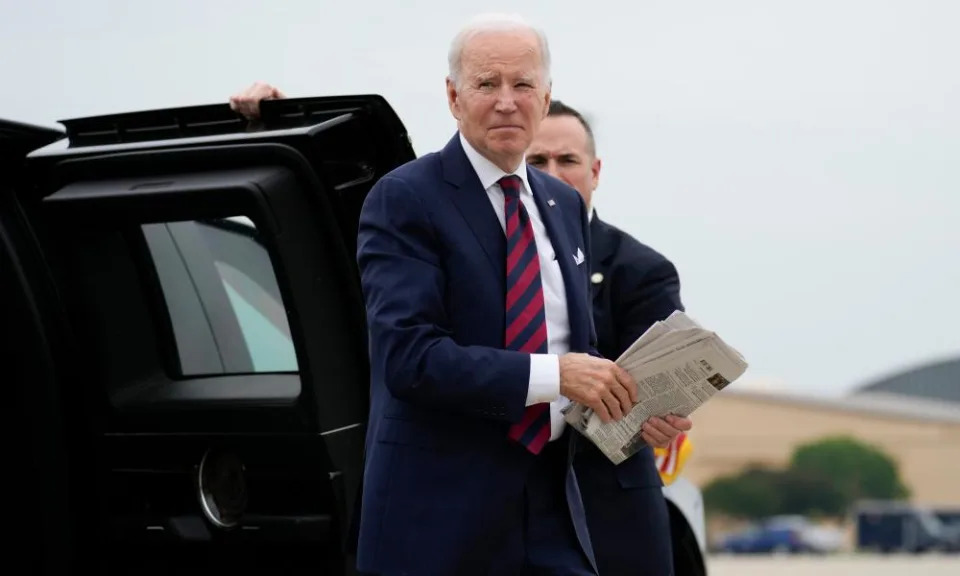Biden is turning away from free trade – and that’s a great thing
Robert Reich
Tue, 29 August 2023

Photograph: Carolyn Kaster/AP
President Joe Biden is making a break with decades of free trade deals and embarking on an industrial policy designed to revive American manufacturing.
This has caused consternation among free-traders, including some of my former colleagues from the Clinton and Obama administrations.
For example, Lawrence Summers, the former treasury secretary, last month called the president’s thinking “increasingly dangerous” and expressed concern about what he termed “manufacturing-centered economic nationalism that is increasingly being put forth as a general principle to guide policy”.
Well, this veteran of the Clinton administration – me – is delighted by what Biden is doing.
Clinton and Obama thought globalization inevitable and bought into the textbook view that trade benefits all parties. “Globalization is not something we can hold off or turn off,” Clinton explained in 2000. “It is the economic equivalent of a force of nature, like wind or water.”
But “globalization” is not a force of nature. How it works and whom it benefits or harms depends on specific, negotiated rules about which assets will be protected and which will not.
In most trade deals, the assets of US corporations (including intellectual property) have been protected. If another nation adopts strict climate regulations that reduce the value of US energy assets in that country, the country must compensate the US firms. Wall Street has been granted free rein to move financial assets into and out of our trading partners.
But the jobs and wages of US workers have not been protected. Why shouldn’t US corporations that profit from trade be required to compensate US workers for job losses due to trade?
Why shouldn’t US corporations that profit from trade be required to compensate US workers for job losses due to trade?
The age-old economic doctrine of “comparative advantage” assumes that more trade is good for all nations because each trading partner specializes in what it does best. But what if a country’s comparative advantage comes in allowing its workers to labor under dangerous or exploitative conditions?
Why shouldn’t the US’s trading partners be required to have the same level of worker safety as that of the United States or give their own workers the same rights to organize unions?
Globalization doesn’t answer these sorts of questions. Instead, the rules that emerge from trade negotiations reflect domestic politics and power.
The Clinton administration lobbied hard for the North American Free Trade Agreement (Nafta). In the end, Congress ratified it, with more Republican than Democratic votes. Additional trade agreements followed, along with the creation of the World Trade Organization (WTO) and the opening of trade relations with China, which joined the WTO in 2001.
Trade rose from 19% of the US economy in 1989 to 31% in 2011, according to the World Bank. By 2021, following the pandemic and Trump’s trade war with China, trade’s share of the US economy had drifted down to 25%.
These trade deals have benefited corporations, big investors, executives, Wall Street traders and other professionals.
The pharmaceutical industry has gotten extended drug patents in Mexico, China and elsewhere. Wall Street banks and investment firms have made sure they can move capital into and out of these countries despite local banking laws. US oil companies can seek compensation if a country adopts new environmental standards that hurt their bottom lines.
The stock market has responded favorably to free trade policies. In 1993, when Clinton took office, the Dow Jones industrial average peaked at 3,799 points. By the time he left office in 2001, it had topped 11,000.
Middle- and working-class Americans have benefited from these deals as consumers – gaining access to lower-priced goods from China, Mexico and other countries where wages are lower than those in the US.
But the trade deals also have caused millions of US jobs to be lost, and the wages of millions of Americans to stagnate or decline.
Between 2000 and 2017, a total of 5.5m manufacturing jobs vanished. Automation accounted for about half of the loss, and imports, mostly from China, the other half.
You can trace a direct line from these trade deals and the subsequent job losses to the rise of Donald Trump in 2016.
Economists have estimated that, if the US had imported half of what China exported to us during these years, four key states – Michigan, Wisconsin, Pennsylvania and North Carolina – would have swung Democratic, delivering the presidency to Hillary Clinton.
Whether globalization is good or bad depends on who gets most of its benefits and who pays most of its costs. For too long, US workers have paid disproportionately.
The Biden administration is changing this. I say, it’s about time.
Robert Reich, a former US secretary of labor, is a professor of public policy at the University of California, Berkeley, and the author of Saving Capitalism: For the Many, Not the Few and The Common Good. His newest book, The System: Who Rigged It, How We Fix It, is out now. He is a Guardian US columnist. His newsletter is at robertreich.substack.com.
No comments:
Post a Comment